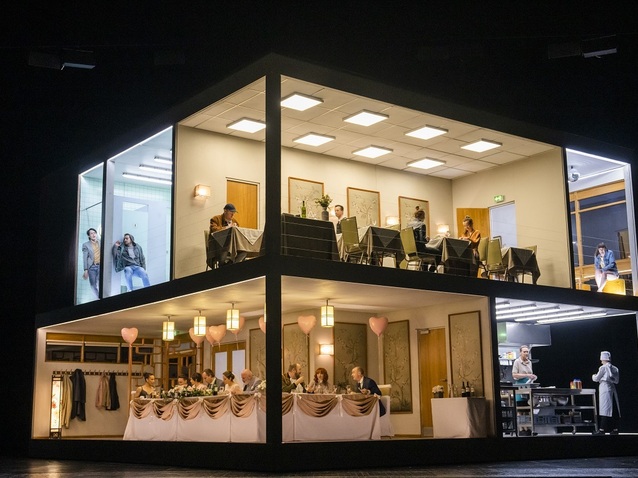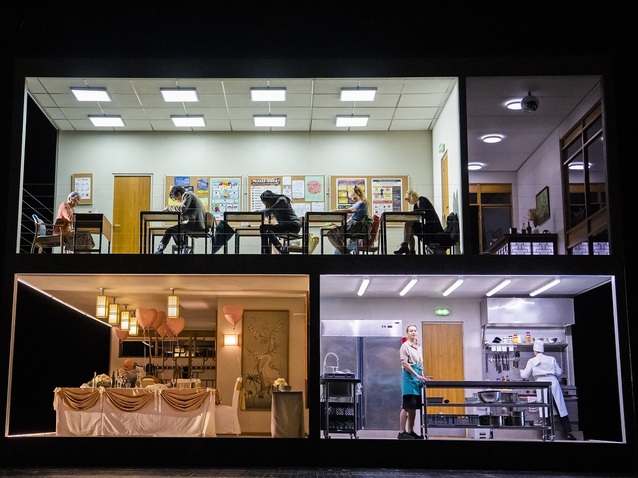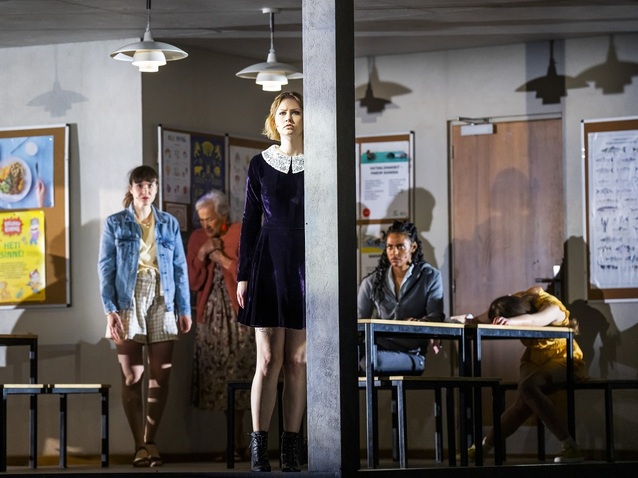 © Tristram Kenton
© Tristram Kenton
Kaija Saariaho’s Innocence, which is currently enjoying its UK premiere at the Royal Opera House, is one opera where it does not pay to read the synopsis in advance. In most instances, the advantage of having some prior knowledge of what to look out for outweighs the disadvantage of any surprises being spoilt, but that is not the case here. This is because it is an opera in which we are constantly learning new things as the drama unfolds, with some of the revelations being so unexpected that they really seem to come out of the blue.
Set in Helsinki, the story focuses on the wedding of Stela (an excellent Lilian Farahani) and Tuomas (an equally splendid Markus Nykänen). She met him when he was vacationing in Romania, and is now making a new life for herself in Finland. Tuomas’s family are a permanent fixture there, and so it seems strange from the start that there are not more guests at the wedding. We hear his father Henrik (Christopher Purves proving to be luxury casting) tell his mother Patricia (a superb Sandrine Piau) that they really should have told Stela the family’s terrible secret, and we as the audience do not initially know what it is. In fact, it is around forty minutes before we gain a concrete sense of the terrible event that occurred ten years earlier, but discovering what actually happened is only the beginning. Across the remainder of the opera we learn how it has affected a wealth of different characters right through to the present; about a host of factors that fed into the event in the first place, and some additional facts that totally alter our perception of it.
Chloe Lamford’s set sees a box-like building, comprising several rooms and two storeys, occupy the stage. In this way, it reveals the venue for the wedding reception currently taking place, and the site of the tragedy ten years earlier. The fact that it revolves helps us to view the situation from multiple perspectives, and to appreciate different characters’ reactions to the tragedy. The mixing of the two spaces in this one block also highlights the mingling of past and present as one has a profound effect on the other. One sign above the entrance to the building may change, and hence hint at different locations, but overall the blurring of boundaries regarding time and place is an important component of the drama.

Innocence ROH © Tristram Kenton 2023
In Simon Stone’s production there is a strong attention to detail so that we see Patricia chiding Henrik for pouring himself too much champagne at the wedding. We are are left to wonder if this simply represents a wife’s concern that her husband might get a little drunk on her son’s big day, or if she genuinely fears the terrible secrets that might come out if he lets down his guard. The opera is very clever in both creating tension and making us feel for the characters. When fairly early on the waitress Tereza (a sublime Jenny Carlstedt) sees Stela, one can see how she is torn between not telling this innocent bystander about the dreadful event, and wanting to do so because it feels wrong that the family responsible should be able to live their lives now, while hers is totally destroyed. It also highlights how events that could have gone either way pervade all aspects of the story because had other catering service employees not fallen ill, Tereza would never have been at this wedding and so it might have proceeded without anything being dragged up at all.
The opera is about one tragic event in one community, but reveals in interesting ways how such things do occur in many places. In fact, Tuomas says that whenever he hears of a similar tragedy elsewhere a strange part of him is happy as it proves that his own family is not so uniquely evil. There are also people in this community who have become ‘experts’ on such events, who the media go to whenever similar ones arise elsewhere. Above all, the opera reminds us that while the cameras can see such a terrible occurrence as something that lasts a few days before moving on, the community in question lives with the consequences forever. Indeed, the fact that many places are in the same situation does not make things any better, but rather worse because it means a plethora of communities have been torn apart. We also see how people are affected in little ways such as one person being judged for going out jogging soon after the event. Others live with constant regret as they look back at certain signs that things were amiss, which they did not act upon at the time. This has now made them paranoid as they are constantly on the lookout for unusual behaviour, and end up reading things into situations that are simply not there.

Innocence ROH © Tristram Kenton 2023
Nevertheless, in spite of there being several points where the tragedy might have been prevented, the opera also puts paid to the idea of it being a momentary freak event. It had multiple causes (and protagonists) and was in the making for a year. This is in itself raises questions regarding responsibility for it, because if the occurrences that inspired the event occurred twelve months before it what level of blame can actually be attributed to them? There are some signs of people finally being able to move on at the end, but this proves to be one of the piece’s very few missteps. While we may assume they are able to do so because ten years have passed, it feels incongruent with what we actually see because the revelation in the previous scene could hardly be the thing that helps them to turn the page.
Although the hard hitting subject matter means the opera could not exactly be described as enjoyable, it is highly captivating and extremely worthwhile. Given the issue in question, everything is presented as sensitively as it possibly could be, and it is absolutely crucial that this 100 minute opera runs without an interval, such is the need to maintain the intensity that is established. This does, however, beg the question of whether Innocence is a truly great opera or ‘merely’ a compelling piece of drama. It is, however, the former because Saariaho’s music, with its iridescent colours and shimmering sounds that conductor Susanna Mälkki captures to perfection, is absolutely fundamental to making the experience what it is. There are many vocal delights as well with the different cast members both singing and speaking in a variety of languages, with parts of Sofi Oksanen’s original Finnish libretto having been translated by Aleksi Barrière. There is even a character called Markéta who sings in the Finno-Ugric folk style of northern Finland, with expert in the relevant techniques Vilma Jää giving a performance that is as intriguing as it is outstanding. It may be possible to argue that Saariaho’s score does not support the work as a whole in the way in which music ‘traditionally’ does so in an opera, but that makes it no less valid. Opera is a constantly evolving art form, so if the music and drama interact in a seemingly unusual way that only proves what a groundbreaking piece Innocence really is.
By Sam Smith
Innocence | 17 April - 4 May 2023 | Royal Opera House, Covent Garden
the 20 of April, 2023 | Print
Comments